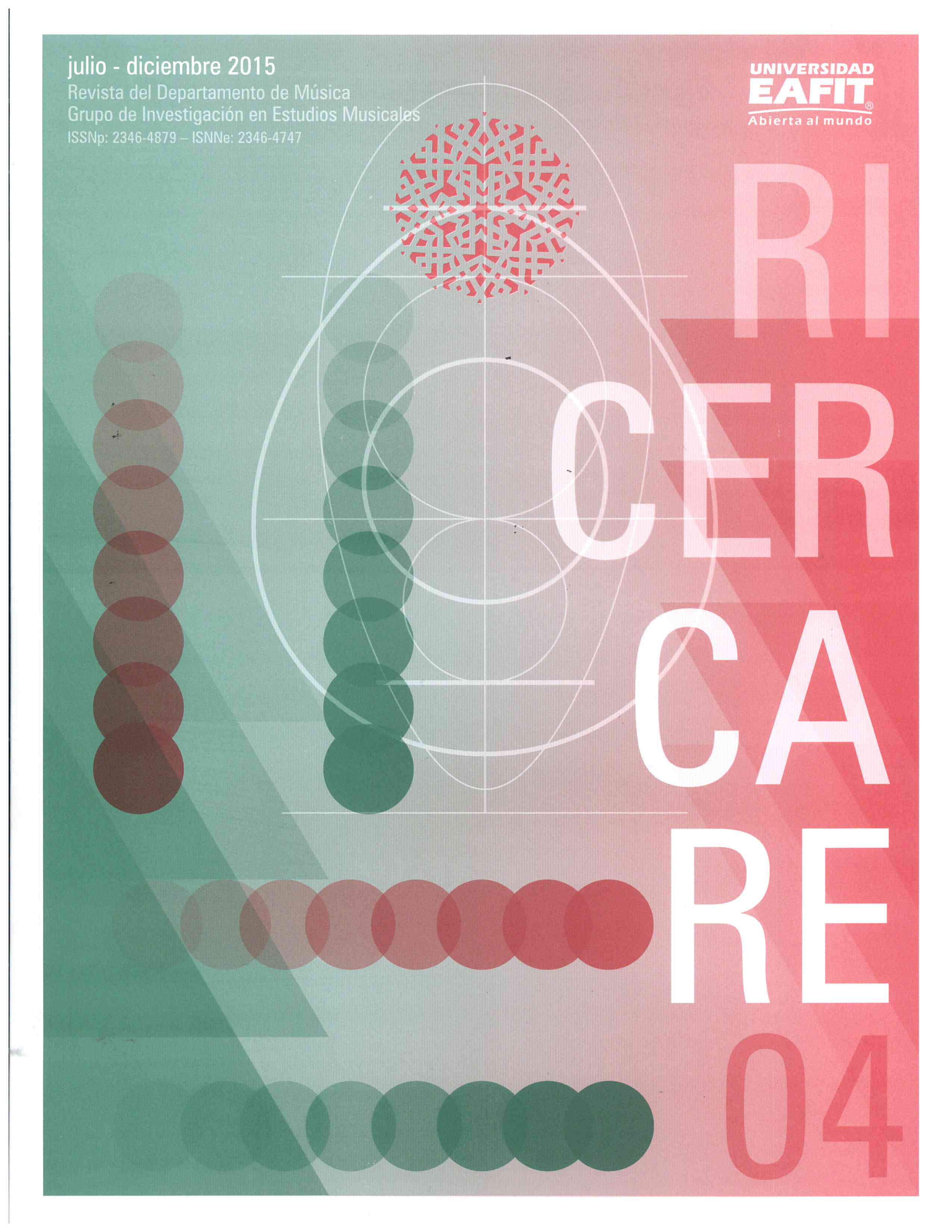Una perspectiva y ocho invitaciones al diálogo
Main Article Content
Keywords
Music education, Pedagogy, Human development
Abstract
The author begins by recognizing significant progress in the achievement of technical developments and the motor and mental skills required in music. He approaches these issues from a humanistic and critical perspective, and warns about the difficulties of the actual training model to provide acomplete and proper culture. In other words, he tends towards an education that not only trains students to deploy and exhibit certain skills, such as playing/singing in tune, reading music, having a fluent rhythm, performing repertoires, etc; but which also helps students to recognize their individuality. Such education will lead to the development of critical views, allowing students to experience their collective nature, and preparing them to act comfortably in the world of language, reason and emotion. By gathering ideas from authors such as Michel Serres, Boaventura de Souza Santos, and philosopher Martha Nussbaum, the author points at possible paths towards a type of music education, which will enhances the flourishing of human beings, as it aims for a fulfilling and happy life.
Downloads
Download data is not yet available.
References
Aharonian, C. (1992). Conversaciones sobre músi-ca, cultura e identidad. Montevideo: Tacuabé.
Arenas, Monsalve, E. (2011). Utopías de la educa-ción Musical en Colombia. Dilemas y conflictos de re-presentaciones. En VI Congreso Nacional de Música. Medellín. Disponible en: www. eloidoqueseremos.blogspot.com
Carrière, J.-C. (2006). Fragilidad. Barcelona: Península.
De Souza, B. (2009). Una epistemología del sur. La reinvención del conocimiento y la emancipación social. Buenos Aires: Siglo XXI y CLACSO.
Esquirol, J. M. (2015). La resistencia íntima. Ensayo de una filosofía de la proximidad. Barce-lona: Acantilado.
Gómez-Vignes, M. (1991). Imagen y obra de Anto-nio María Valencia, volumen 1. Cali: Corporación para la Cultura.
González, J. P. (2014). Música popular, musicología y educación en América Latina. Pp.125-134.
En Heis-ter, H., y Mühlschlegel, W. (Eds). (2014). Sonidos y hombres libres. Música nueva de América Latina entre los siglos XX y XXI, pp. 125-134. Madrid, Iberoameri-cana-Vervuert.
Hemsy de Gainza, V. (2013). El rescate de la pe-dagogía musical. Conferencias, escritos, entrevistas (2000-2012). Buenos Aires: Lumen.Hesmondhalgh, D. (2015). ¿Por qué es importante la música? Madrid: Paidós Entornos.
Leff, E. (2014). La apuesta por la vida. Imaginación sociológica e imaginarios sociales en los territorios del sur. México: Siglo XXI.
Le-Moigne, J.-L., y Morin, E. (2006).Inteligencia de la complejidad. Epistemología y pragmática. Aviñón: Universidad Mundo Real; Edgar Morin; una visión in-tegradora y Ediciones de l’Aube. Recuperado el ... de ... de ..., de: http://www.edgarmorin.org/descarga-inteligencia-de-la-complejidad.html
Nussbaum, M. C. (2001). Paisajes del pensamiento. La inteligencia de la emociones. Madrid: Paidós.
Ryle, G. (2005), El concepto de lo mental. Barcelo-na: Paidós Ibérica.
Schusterman, R. (2002). Estética pragmatista. Vi-viendo la belleza, repensando el arte. Madrid: l Idea Books.
Serres, M. (1994). Atlas. Madrid: Cátedra Teorema.
Serres, M. (2013). Pulgarcita. México, D. F.: Fondo de Cultura Económica.
Valencia Zamorano, A. M. (1932). Breves apuntes sobre la educación musical en Colombia. Bogotá: A. J. Posse.
Arenas, Monsalve, E. (2011). Utopías de la educa-ción Musical en Colombia. Dilemas y conflictos de re-presentaciones. En VI Congreso Nacional de Música. Medellín. Disponible en: www. eloidoqueseremos.blogspot.com
Carrière, J.-C. (2006). Fragilidad. Barcelona: Península.
De Souza, B. (2009). Una epistemología del sur. La reinvención del conocimiento y la emancipación social. Buenos Aires: Siglo XXI y CLACSO.
Esquirol, J. M. (2015). La resistencia íntima. Ensayo de una filosofía de la proximidad. Barce-lona: Acantilado.
Gómez-Vignes, M. (1991). Imagen y obra de Anto-nio María Valencia, volumen 1. Cali: Corporación para la Cultura.
González, J. P. (2014). Música popular, musicología y educación en América Latina. Pp.125-134.
En Heis-ter, H., y Mühlschlegel, W. (Eds). (2014). Sonidos y hombres libres. Música nueva de América Latina entre los siglos XX y XXI, pp. 125-134. Madrid, Iberoameri-cana-Vervuert.
Hemsy de Gainza, V. (2013). El rescate de la pe-dagogía musical. Conferencias, escritos, entrevistas (2000-2012). Buenos Aires: Lumen.Hesmondhalgh, D. (2015). ¿Por qué es importante la música? Madrid: Paidós Entornos.
Leff, E. (2014). La apuesta por la vida. Imaginación sociológica e imaginarios sociales en los territorios del sur. México: Siglo XXI.
Le-Moigne, J.-L., y Morin, E. (2006).Inteligencia de la complejidad. Epistemología y pragmática. Aviñón: Universidad Mundo Real; Edgar Morin; una visión in-tegradora y Ediciones de l’Aube. Recuperado el ... de ... de ..., de: http://www.edgarmorin.org/descarga-inteligencia-de-la-complejidad.html
Nussbaum, M. C. (2001). Paisajes del pensamiento. La inteligencia de la emociones. Madrid: Paidós.
Ryle, G. (2005), El concepto de lo mental. Barcelo-na: Paidós Ibérica.
Schusterman, R. (2002). Estética pragmatista. Vi-viendo la belleza, repensando el arte. Madrid: l Idea Books.
Serres, M. (1994). Atlas. Madrid: Cátedra Teorema.
Serres, M. (2013). Pulgarcita. México, D. F.: Fondo de Cultura Económica.
Valencia Zamorano, A. M. (1932). Breves apuntes sobre la educación musical en Colombia. Bogotá: A. J. Posse.

